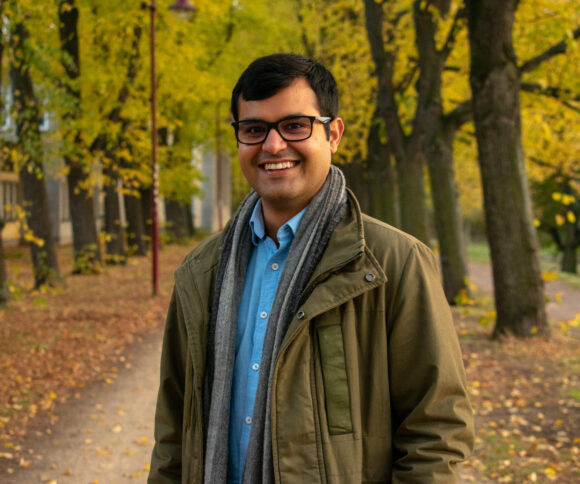
Entering the German Job Market as an International Student
Career update: Since August 2022 Gaurang Verma is working as Business Planning Lead at HH2E
Interview with HHL Alumnus Gaurang Verma, Senior Analyst at Axel Springer SE
This interview was first published in September 2020.
Gaurang Verma left his home country India to study the full-time Master in Management program at HHL in 2017. While he already spoke a little German he was intentional about increasing his language skills through internships to find an attractive position after graduation. Today, he works as a senior analyst in Corporate Development, Business Development and Investments at Axel Springer SE in Berlin.
In this interview, he talks about why it is best to start learning German before you move to Germany and how he navigated the job market during his studies to find the perfect company structure to match his personal preferences.
“The more German you know the better! I would recommend at least B1 as this will make your life easier.”
We’ll start with your studies at HHL. What specifically made you decide to study at HHL?
I learned some German alongside my bachelor studies and was looking for a more international experience for my master studies, as I’d always felt more aligned with European values. The DACH region (Germany, Austria, Switzerland) was a natural choice. HHL stood out amongst the other well-ranked master programs due to its course structure, majors and focus on entrepreneurship and innovation. Moreover, I would add HHL being based in Leipzig was also a plus point.

Gaurang Verma at his graduation in 2019
Next I would like to look at your current job. What does your job as senior analyst at Axel Springer SE entail?
At Axel Springer I work for a team called Corporate & Business Development and Investments. It is project-based work where half of the time I am supporting strategic projects within our various portfolio companies and the other half is spent working with portfolio management to acquire or sell companies. It basically entails a lot of research, analysis and presentations.
“HHL stood out amongst the other well ranked master programs due to its course structure, majors and focus on entrepreneurship and innovation.”
Looking back at your work experience: What has helped you navigate the German job market and find the right path for you?
I had limited work experience from my time in India and so I maximized the internships I could do during my studies by going for a shorter exchange term. My first internship was at Wundercurves, located in the Spinlab in Leipzig. I worked on the financial model for Series A fundraising and got to use my skills acquired during my classes at HHL. In the end I worked for this start-up and two larger corporates and realized that I prefer to start my career in the latter.
Looking back, it was a cumulation of countless applications, my classmates support and experience, seniors from HHL, HHL Alumni, SpinLab as well as the Career Development Team that allowed me to get where I am today.
“Leipzig is a big enough city where one has access to enough events and restaurants yet everything is still super convenient to reach and the rent is cheap.”
How did the HHL Career Services support you during your studies and after graduation?
It started with the basics of the German job market, career events, CV and cover letter feedback and just overall advice of how one might go about it. Even today I still keep in contact with Anett from Career Developments or Sigrid from Alumni Relations. There are a lot of resources available at HHL and one should definitely take advantage of them.
What was your impression of Leipzig as a place to live and study in? Can you share a favorite memory?
Leipzig is a big enough city where one has access to enough events and restaurants yet everything is still super convenient to reach and the rent is cheap. It is much closer in terms of culture to Berlin than to Frankfurt or Munich with the latter being what most foreigners expect Germany to be like. My favorite part is definitely the access to nature. Leipzig is surrounded by multiple lakes that are easy to reach by bike or public transport. The many parks and canals in the city center offer additional activities to relax after classes or as an escape for the weekend.
“And one of the best resources to learn and adapt are your German peers and all seniors.”
What advice do you have for students wishing to enter the German job market through a Master in Management? How can they successfully navigate the cultural transition?
The more German you know the better! I would recommend at least B1 as this will make your life easier. The expectation in the German job market is to have plenty of internships, ideally in semi related fields. Therefore I would recommend to focus on that once you start your studies. One option could be to skip a semester and/or do a shorter exchange so you can fit more in. And one of the best resources to learn and adapt are your German peers and all seniors. Even though you attend a good business school you will still need to send out multiple applications but remember persistence is key!
Discover HHL’s full-time Master in Management Program
Find out if the full-time Master in Management is the right program for you. We are happy to answer any questions you may have and support you with additional information. To connect with Jana Vogel, program manager for the full-time Master in Management, just click on the little envelope below the author’s name beneath this post.
Photo Credit (Header Photo): Moritz Reiss

Hello, I'm Jana. I have been working for HHL for almost 20 years and know the DNA of our university very well. As the Director of Program Marketing I´m here for you to answer all questions about our Master's programs, including the General Management Track, our Finance Track and Entrepreneurship Track. Feel free to reach out to me. I am more than happy to assist!


